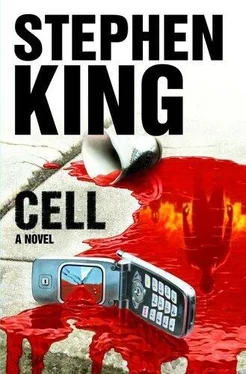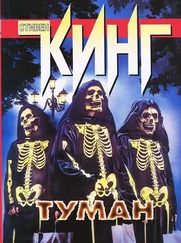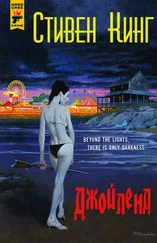"They left the dead and the totally unconscious ones," Tom said, "but they actually helped a couple who were stirring."
Clay looked for the pregnant woman and didn't see her. "Mrs. Scottoni?"
"She was one of the ones they helped," Tom said.
"So they're acting like people again."
"Don't get that idea," Alice said. "One of the men they tried to help couldn't walk, and after he fell down a couple of times, one of the guys who'd been lifting him got tired of being a Boy Scout and just—"
"Killed him," Tom said. "Not with his hands, either, like the guy in the garden. With his teeth. Tore out his throat."
"I saw what was going to happen and looked away," Alice said, "but I heard it. He . . . squealed."
"Easy," Clay said. He squeezed her arm gently. "Take it easy."
Now the street was almost entirely empty. Two more stragglers came along, and although they moved more or less side by side, both were limping so badly there was no sense of unison about them.
"Where are they going?" Clay asked.
"Alice thinks maybe inside," Tom said, and he sounded excited. "Before it gets dark. She could be right."
"Where? Where are they going in? Have you seen any of them going into houses along this block?"
"No." They said it together.
"They didn't all come back," Alice said. "No way did as many come back up Salem Street as went down this morning. So a lot are still in Malden Center, or beyond. They may have gravitated toward public buildings, like school gymnasiums . . ."
School gymnasiums. Clay didn't like the sound of that.
"Did you see that movie, Dawn of the Dead?" she asked.
"Yes," Clay said. "You're not going to tell me someone let you in to see it, are you?"
She looked at him as if he were nuts. Or old. "One of my friends had the DVD. We watched it at a sleepover back in eighth grade." Back when the Pony Express still rode and the plains were dark with buffalo, her tone said. "In that movie, all the dead people—well, not all, but a lot—went back to the mall when they woke up."
Tom McCourt goggled at her for a second, then burst out laughing. It wasn't a little laugh, either, but a long series of guffaws, laughter so hard he had to lean against the wall for support, and Clay thought it wise to shut the door between the hall and the porch. There was no telling how well the things straggling up the street might hear; all he could think of at the moment was that the hearing of the lunatic narrator in Poe's "The Tell-Tale Heart" had been extremely keen.
"Well they did," Alice said, putting her hands on her hips. The baby sneaker flopped. "Straight to the mall." Tom laughed even harder. His knees buckled and he oozed slowly down to the hall floor, howling and flapping his hands against his shirt.
"They died . . . ," he gasped, ". . . and came back . . . to go to the mall. Jesus Christ, does Jerry F-Falwell. . ." He went off into another gale. Tears were now running down his cheeks in clear streams. He brought himself under control enough to finish, "Does Jerry Falwell know heaven's the Newcastle Mall?"
Clay also began to laugh. So did Alice, although Clay thought she was a little bit pissed off that her reference had been greeted not with interest or even mild good humor but outright howls. Still, when people started laughing, it was hard not to join in. Even when you were pissed.
They had almost stopped when Clay said, apropos of nothing, "If heaven ain't a lot like Dixie, I don't want to go."
That set them off again, all three. Alice was still laughing when she said, "If they're flocking, then roosting for the night in gyms and churches and malls, people could machine-gun them by the hundreds."
Clay stopped laughing first. Then Tom stopped. He looked at her, wiping moisture out of his neat little mustache.
Alice nodded. The laughter had brought high color to her cheeks, and she was still smiling. She had, at least for the moment, careened past pretty and into genuine beauty. "By the thousands, maybe, if they're all going to the same place."
"Jesus," Tom said. He took off his glasses and began to wipe them, too. "You don't fool around."
"It's survival," Alice said matter-of-factly. She looked down at the sneaker tied to her wrist, then up at the men. She nodded again. "We ought to chart them. Find out if they 're flocking and when they're flocking, If they're roosting and where they're roosting. Because if they can be charted—"
18
Clay had led them out of boston, but when the three of them left the house on Salem Street some twenty-four hours later, fifteen-year-old Alice Maxwell was unquestionably in charge. The more Clay thought about it, the less it surprised him.
Tom McCourt didn't lack for what his British cousins called bottle, but he was not and never would be a natural leader. Clay had some leadership qualities, but that evening Alice had an advantage beyond her intelligence and desire to survive: she had suffered her losses and begun to move on. In leaving the house on Salem Street, both men were dealing with new ones. Clay had begun to suffer a rather frightening depression that at first he thought was just the result of his decision—unavoidable, really—to leave his portfolio behind. As the night went on, however, he realized it was a profound dread of what he might find if and when he got to Kent Pond.
For Tom, it was simpler. He hated to leave Rafe.
"Prop the door open for him," Alice said—the new and harder Alice, who seemed more decisive by the minute. "He'll almost certainly be okay, Tom. He'll find plenty of forage. It'll be a long time before the cats starve or the phone-crazies work their way down the food-chain to cat-meat."
"He'll go feral," Tom said. He was sitting on the living room couch, looking stylish and miserable in a belted raincoat and trilby hat. Rafer was on his lap, purring and looking bored.
"Yeah, that's what they do," Clay said. "Think of all the dogs—the little ones and the oversized ones—that are just going to flat die."
"I've had him for a long time. Since he was a kitten, really." He looked up and Clay saw the man was on the verge of tears. "Also, I guess I see him as my luck. My mojo. He saved my life, remember."
"Now we're your mojo," Clay said. He didn't want to point out that he himself had almost certainly saved Tom's life once already, but it was true. "Right, Alice?"
"Yep," she said. Tom had found a poncho for her, and she wore a knapsack on her back, although there currently was nothing in it but batteries for the flashlights . . . and, Clay was quite sure, that creepy little sneaker, which was at least no longer tied to her wrist. Clay was also carrying batteries in his pack, along with the Coleman lantern. They had nothing else, at Alice's suggestion. She said there was no reason for them to carry what they could pick up along the way. "We're the Three Musketeers, Tom—all for one and one for all. Now let's go over to the Nickle-bys' house and see if we can get some muskets."
"Nickerson." He was still stroking the cat.
She was smart enough—and compassionate enough, maybe that, too—not to say something like Whatever, but Clay could see she was getting low in the patience department. He said, "Tom. Time to go."
"Yeah, I suppose." He started to put the cat aside, then picked it up and kissed it firmly between the ears. Rafe bore it with no more than a slight narrowing of the eyes. Tom put it down on the sofa and stood. "Double rations in the kitchen by the stove, kiddo," he said. "Plus a big bowl of milk, with the rest of the half 'n' half poured in for good measure. Back door's open. Try to remember where home is, and maybe . . . hey, maybe I'll see you."
Читать дальше








